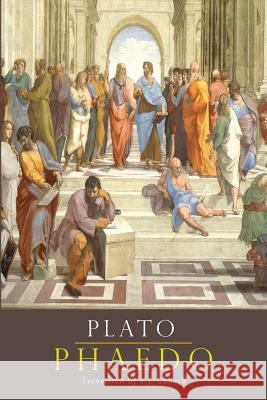Phaedo » książka
Phaedo
ISBN-13: 9781614279204 / Angielski / Miękka / 2016 / 94 str.
Phaedo
ISBN-13: 9781614279204 / Angielski / Miękka / 2016 / 94 str.
(netto: 29,14 VAT: 5%)
Najniższa cena z 30 dni: 30,18
ok. 16-18 dni roboczych.
Darmowa dostawa!
2016 Reprint of the 1951 edition. Full facsimile of the original edition, not reproduced with Optical Recognition Software. "Phaedo," also known to ancient readers as "On The Soul," is one of the best-known dialogues of Plato's middle period, along with the Republic and the Symposium. It depicts the death of Socrates and is also Plato's fourth and last dialogue to detail the philosopher's final days. In the dialogue Socrates discusses the nature of the afterlife on his last day before being executed. Socrates has been imprisoned and sentenced to death by an Athenian jury for not believing in the gods of the state and for corrupting the youth of the city. The dialogue is told from the perspective of one of Socrates' students, Phaedo of Elis. Having been present at Socrates' death bed, Phaedo relates the dialogue from that day to Echecrates, a Pythagorean philosopher. By engaging in dialectic with a group of Socrates' friends, including the Thebans Cebes and Simmias, Socrates explores various arguments for the soul's immortality in order to show that there is an afterlife in which the soul will dwell following death.
2016 Reprint of the 1951 edition. Full facsimile of the original edition, not reproduced with Optical Recognition Software. "Phaedo", also known to ancient readers as "On The Soul," is one of the best-known dialogues of Platos middle period, along with the Republic and the Symposium. It depicts the death of Socrates and is also Platos fourth and last dialogue to detail the philosophers final days. In the dialogue Socrates discusses the nature of the afterlife on his last day before being executed. Socrates has been imprisoned and sentenced to death by an Athenian jury for not believing in the gods of the state and for corrupting the youth of the city. The dialogue is told from the perspective of one of Socrates students, Phaedo of Elis. Having been present at Socrates death bed, Phaedo relates the dialogue from that day to Echecrates, a Pythagorean philosopher. By engaging in dialectic with a group of Socrates friends, including the Thebans Cebes and Simmias, Socrates explores various arguments for the souls immortality in order to show that there is an afterlife in which the soul will dwell following death.











